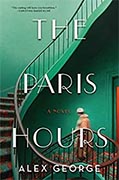The Paris Hours
Alex George
book reviews:
· general fiction
· chick lit/romance
· sci-fi/fantasy
· graphic novels
· nonfiction
· audio books
· author interviews
· children's books @
curledupkids.com
· DVD reviews @
curledupdvd.com
newsletter
win books
buy online
links
home
for authors
& publishers
for reviewers

 |
The Paris Hours Alex George Flatiron Books Hardcover 272 pages May 2020 |
|
Despite the dark tone of death and disillusionment presented throughout the story, author Alex George has crafted a clever depiction of the deteriorating lives of a group of Parisians, uncannily connecting them to a single day. George's novel pays tribute to the memories of 1927 Paris and great artists of the time: Gertrude Stein; Alice Toklas; the dark, lithe Mademoiselle Josephine Baker; and the author Marcel Proust who, as the novel opens, is in disarray, uncombed and beardless as if reluctant to engage too completely with the world in which he finds himself.
These characters struggle with depression and disillusionment, including the great Proust. Souren's puppets burst into life from beneath the tabletop. He recalls his escape from the Turks during the Great War. Emile owes money to Guillaume, who runs a network of crime and larceny that stretches across the capital from rat-infested squats in Belleville. Desperate to pay his debts, he comes across as a surplus man, alone in the world with no chance to make ends meet -- until he meets Gertrude Stein, who finally takes an interest in his paintings. Also desperate for work is Jean Paul, who makes a list of a series of profiles of American expatriates now living in Paris, potential subjects that include Mademoiselle Baker. At Proust's house, Camille devotes herself completely to his every need, scrubbing and dusting from morning to night. No amount of cleaning can eradicate "the faint whiff" of better times. Employed as Proust's cleaner and companion, her husband Olivier sees her as a sort of outcast, dependent on a disjointed, dysfunctional, aging man for her livelihood. The novel is a replete with symbols and associations. George uses internal monologue and carefully chosen words to create an almost poetic quality, of similar images, of each character's past at different times, particularly Souren who is a "good boy and a brave boy." Souren's instinct for survival empowers much of the narrative. As he walks through the meandering Latin Quarter without design or purpose, he thinks of his puppet performance and how it has become increasingly frenetic and edged out beneath the weight of his sadness. Fate plays tricks on the beleaguered heart. While The Paris Hours may be similar in form and tone to Cunningham's The Hours, it's more of a traveler's tale, a delicate ode to the long-forgotten streets of Paris and the artists who once inhabited it. Amid the themes of death, disintegrating relationships and disillusionment, there are many tender moments of love and endearment. Guillaume's romanticism and love of nature - set in a natural way - compare to Souren's sudden realization that life's precious moments make all of the other dismal hours seem worthwhile. In the end, The Paris Hours reads like a series of love letters to areas of 1920s Paris. George vividly conveys the city's energy, overcrowding and mess, seen from the view of Camille's daily commute to Proust's apartment. George seems to be deliberately giving us Dickensian pastiche, but with a French twist zooming out to narrative vistas of the city before returning to the lives and homes of his characters. Originally published on Curled Up With A Good Book at www.curledup.com. © Michael Leonard, 2020 |
| Also by Alex George: |
|
|
|
 Click here to learn more about this month's sponsor! |
|
| fiction · sf/f · comic books · nonfiction · audio newsletter · free book contest · buy books online review index · links · · authors & publishers reviewers |
|
| site by ELBO Computing Resources, Inc. | |
 The Paris Hours is about the triumphant hours that each of us sifts out from the mundane and sometimes tragic moments of human existence. Emile wonders through Montmartre, anxiously trying to outpace his problems. He's made his mournful declaration of love for Therese, a prostitute. He knows her, albeit not professionally, though he has painted her many times. Meanwhile, Jean-Paul Maillard closes his eyes and dreams of a woman and her daughter who walk out of the Metro Station, while Camille Clermont kneels down in front of the tombstone of her dead employer and begins to weep. Every morning the piano rescues Souren Balakian from his dreams and the ghosts that haunt his sleep.
The Paris Hours is about the triumphant hours that each of us sifts out from the mundane and sometimes tragic moments of human existence. Emile wonders through Montmartre, anxiously trying to outpace his problems. He's made his mournful declaration of love for Therese, a prostitute. He knows her, albeit not professionally, though he has painted her many times. Meanwhile, Jean-Paul Maillard closes his eyes and dreams of a woman and her daughter who walk out of the Metro Station, while Camille Clermont kneels down in front of the tombstone of her dead employer and begins to weep. Every morning the piano rescues Souren Balakian from his dreams and the ghosts that haunt his sleep.